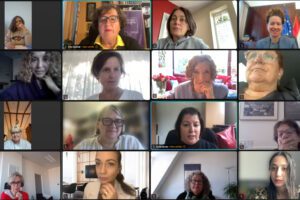Today, 10 November, PES Women marks European Unequal Equal Pay Day to raise awareness of the gender pay gap.
Equal pay for equal work or work of equal value has been enshrined in the European Treaties since 1957. Yet, today the average pay gap between men and women in the EU is 14.1%. In some countries, it is far higher.
European Unequal Pay Day signals the symbolic day on which women in Europe start working for free compared to men. For the rest of 2021, women will be giving away their time, energy and creativity without renumeration.
This year’s campaign features a video and portraits by Belgian photographer Jef Boes, which show real young families in their houses, coping with the pressures of telework during the pandemic.
To raise awareness of the unequal share of unpaid care and domestic work between women and men, PES Women is asking people to #ShareYourChaos with pictures and stories on social media of their own unpaid care work.
PES Women President Zita Gurmai said:
“Alongside pay discrimination, a principal cause of the gender pay gap is the unequal sharing of household work and care responsibilities. This was already the case before the pandemic, but during lockdown women have taken on most of the extra domestic and care work.
“This inequality has a big impact on women’s careers. There is a noticeable shift around the age of 30 when people choose to have children. Women are more likely to move to part-time work and take more parental leave, putting their careers on hold. In 2021, gender stereotypes still push women towards care responsibilities while many men are busy building their careers.
“The pandemic has thrown us back in time and is widening the gender pay gap. With this campaign, we want politicians, employers and families to open their eyes to how gender roles unfairly impact women’s economic independence.”
This campaign is part of a larger effort by the progressive family to promote a feminist economy focused on the wellbeing of people and planet. The gender pay gap is an undeniable symptom of an unfair power imbalance and an economic system that undervalues care and women as equal economic actors.
The campaign was launched on 5 November with the online debate: “The Gender Pay Gap: What Can You Do? What Can the EU do?”.
Closing the gender pay gap is a long-standing priority for PES Women and its member organisations. We want the EU to introduce binding targets to close the gender pay and pension gaps, new criteria for assessing work of equal value, and EU pay transparency measures, as well as sanctions for non-compliance. All Member States must implement the Work-Life Balance Directive, making sure parental and care leaves are properly funded. Intersectional anti-discrimination and anti-harassment legislation, EU quotas for women on boards, higher minimum wages, and increased funding for the EU care economy and welfare states are also important steps.
For more information: www.equalpayday.eu



